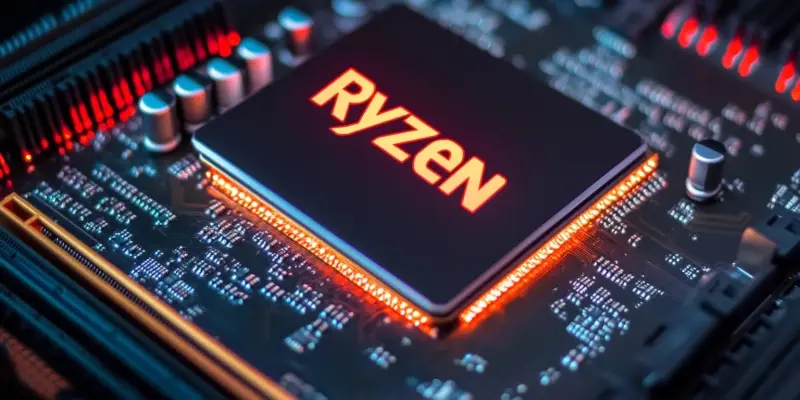In a rare and unexpected incident, an AMD Ryzen 7 9800X3D processor burned out while its owner was merely watching a TV series, prompting concerns and raising questions about the processor’s reliability under light usage conditions. This development is particularly startling because the system had been operating smoothly for over two weeks without any overheating or performance issues. The computer, built with an ASRock Nova X870E motherboard and AMD EXPO memory profiles, was reported to have shut down suddenly, leading to damage to both the processor and motherboard.
An Unexpected Shutdown and Damage
The incident was brought to light by Reddit user t0pli, who shared his experience detailing the unexpected shutdown of his computer just 20 days after it was assembled. According to t0pli, the system was not under heavy load or overclocked, and at the time of the incident, it was running the latest available BIOS version. However, a newer BIOS version was released after the event. The user’s frustration is palpable, as there were no foreseeable reasons for the sudden malfunction. Considering that the system wasn’t pushed to its limits nor tampered with, the community was left pondering whether this could be an isolated case or indicative of a deeper issue with the Ryzen 7 9800X3D processor.
Further analysis into the situation suggests that this may indeed be an isolated occurrence, with no other recent reports of similar incidents involving the AMD Ryzen 7 9800X3D. This processor has garnered positive reviews overall, and the lack of similar cases might indicate the problem is not widespread. Nevertheless, the situation remains disconcerting, especially for users invested in high-performance computing systems. The shortage and high demand for these processors have also led to concerns about potential counterfeit products in circulation, adding another layer of complexity to the investigation.
Analysis and Industry Context
Investigating whether this incident was an isolated malfunction or indicative of a broader issue involves examining past occurrences and analyzing the processor’s performance in various settings. Historically, when such problems arise with CPUs, they can often be traced back to user handling errors, such as improper installation or excessive force during assembly. However, in t0pli’s case, no apparent user errors or system misuse were reported. This has led experts to consider other possibilities, such as bad hardware instances or potential motherboard compatibility issues.
Interestingly, the absence of additional complaints hints that the Ryzen 7 9800X3D may not have reliability concerns as feared. If it were a common problem, other users would likely have raised similar alarms, given the processor’s popularity in the market. The high demand and supply shortages of this model have been known to push consumers toward potentially risky purchases, sometimes involving counterfeits or handled components. Thus, some past issues might have been due to sourcing from unreliable vendors or marketplace irregularities rather than the processor’s inherent flaws.
Potential Implications and Future Considerations
In an unusual and unexpected incident, an AMD Ryzen 7 9800X3D processor failed catastrophically while its owner was merely watching a TV series, triggering concerns and questions about the processor’s reliability under minimal usage conditions. This event is especially alarming given that the system had been operating smoothly for over two weeks without any signs of overheating or performance issues. The computer, built with an ASRock Nova X870E motherboard and utilizing AMD EXPO memory profiles, suddenly shut down, causing irreparable damage to both the processor and the motherboard.
Interestingly, the failure occurred without any heavy gaming or intensive applications running, which are typically associated with pushing the hardware to its limits. The abrupt shutdown and damage to both components have raised concerns among tech enthusiasts and users about the long-term dependability of high-end processors under all types of usage. This incident serves as a reminder that even with state-of-the-art technology, unforeseen failures can happen, underscoring the importance of vigilant monitoring and quality assurance in computer hardware.

